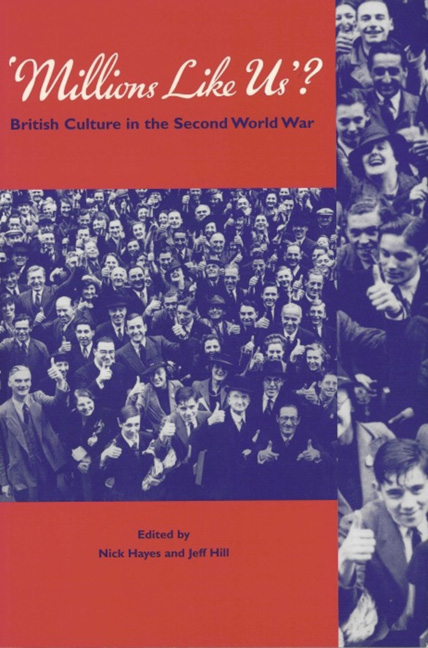Book contents
- Frontmatter
- Contents
- List of Figures and Tables
- Notes on Contributors
- Acknowledgements
- An ‘English War’, Wartime Culture and ‘Millions Like Us’
- British Cinema and ‘The People's War’
- The People's Radio: The BBC and its Audience, 1939–1945
- Was it the Mirror Wot Won it? The Development of the Tabloid Press During the Second World War
- A More Even Playing Field? Sport During and After the War
- A Time for Hard Writers: The Impact of War on Women Writers
- Safe and Sound: New Music in Wartime Britain
- More Than ‘Music-While-You-Eat’? Factory and Hostel Concerts, ‘Good Culture’ and the Workers
- ‘When Work Is Over’: Labour, Leisure and Culture in Wartime Britain
- Not Just a Case of Baths, Canteens and Rehabilitation Centres: The Second World War and the Recreational Provision of the Miners’ Welfare Commission in Coalmining Communities
- ‘You and I – All of Us Ordinary People’: Renegotiating ‘Britishness’ in Wartime
- Postscript: A War Imagined
- Index
A More Even Playing Field? Sport During and After the War
- Frontmatter
- Contents
- List of Figures and Tables
- Notes on Contributors
- Acknowledgements
- An ‘English War’, Wartime Culture and ‘Millions Like Us’
- British Cinema and ‘The People's War’
- The People's Radio: The BBC and its Audience, 1939–1945
- Was it the Mirror Wot Won it? The Development of the Tabloid Press During the Second World War
- A More Even Playing Field? Sport During and After the War
- A Time for Hard Writers: The Impact of War on Women Writers
- Safe and Sound: New Music in Wartime Britain
- More Than ‘Music-While-You-Eat’? Factory and Hostel Concerts, ‘Good Culture’ and the Workers
- ‘When Work Is Over’: Labour, Leisure and Culture in Wartime Britain
- Not Just a Case of Baths, Canteens and Rehabilitation Centres: The Second World War and the Recreational Provision of the Miners’ Welfare Commission in Coalmining Communities
- ‘You and I – All of Us Ordinary People’: Renegotiating ‘Britishness’ in Wartime
- Postscript: A War Imagined
- Index
Summary
In October 1943, in an address to the International Sports Fellowship, Philip Noel-Baker anticipated that ‘we shall need more games, more sport, more physical training and recreation in this country when the war is over than ever we had before’. Although, in the same address, he claimed that games had been ‘the great leveller of men’, he was later to express the wish that participation in sporting competition should not be ‘reserved for those who are rich enough to afford the necessary time’. Noel-Baker hoped, not only for a post-war growth in sporting and recreational activity, but also that the socially-progressive role he believed sport to have played in the past would be continued in the future, so that the ways in which the divisions of social class determined who could or could not play a sport at any given level would diminish. He looked not only to an upsurge in sporting activity but also to its uplifting influence within a more egalitarian society. How far was this dual hope fulfilled?
The character of English sport was to be significantly influenced by an ongoing struggle between several different concepts as to the true purpose of sport, and how, and by whom, sports programmes should be administered. This struggle neither began nor ended with the Second World War. The distinctions within this conflict of ideas were by no means clear cut and Noel-Baker himself represented some of the ambiguities and confusions that were involved. An athlete as an undergraduate at Cambridge, Noel-Baker later won the silver medal in the 1,500 metres at the 1920 Antwerp Olympics. In the 1920s he was closely involved with the Achilles Athletic Club, made up of former Oxford and Cambridge athletes. He believed that it was this club ‘on which the real prosperity of British track athletics rests’. From this background Noel-Baker developed a powerful empathy for what might be termed the ‘Corinthian’ ideal, the code of true amateurism under which sport was pursued for sports’ sake without ulterior political, social or economic motive. On the other hand, as a Labour politician, holding office in the wartime coalition and then in the post-war government, he did not support the exclusiveness of the gentlemen amateurs.
- Type
- Chapter
- Information
- Millions Like Us?British Culture in the Second World War, pp. 125 - 155Publisher: Liverpool University PressPrint publication year: 1999



